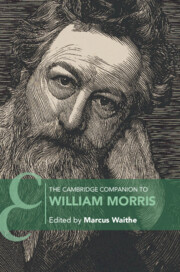Book contents
- The Cambridge Companion to William Morris
- The Cambridge Companion to William Morris
- Copyright page
- Dedication
- Contents
- Figures
- Notes on Contributors
- Acknowledgements
- Note on The Collected Works
- Chronology
- Abbreviations
- Introduction
- Part I Senses of Place
- Part II Authorship
- Chapter 5 Experimental Medievalism
- Chapter 6 Troubling the Heroic Ideal
- Chapter 7 Skaldic Morris
- Chapter 8 ‘The Whole Man’
- Chapter 9 Northern Epic
- Chapter 10 Utopian Fiction
- Chapter 11 Morris’s Prose Romances and the Origins of Fantasy
- Part III The Practical Arts
- Part IV Movements and Causes
- Part V Influences and Legacies
- Guide to Further Reading
- Index
- Cambridge Companions To …
Chapter 6 - Troubling the Heroic Ideal
Morris’s Midlife Poetry
from Part II - Authorship
Published online by Cambridge University Press: 03 May 2024
- The Cambridge Companion to William Morris
- The Cambridge Companion to William Morris
- Copyright page
- Dedication
- Contents
- Figures
- Notes on Contributors
- Acknowledgements
- Note on The Collected Works
- Chronology
- Abbreviations
- Introduction
- Part I Senses of Place
- Part II Authorship
- Chapter 5 Experimental Medievalism
- Chapter 6 Troubling the Heroic Ideal
- Chapter 7 Skaldic Morris
- Chapter 8 ‘The Whole Man’
- Chapter 9 Northern Epic
- Chapter 10 Utopian Fiction
- Chapter 11 Morris’s Prose Romances and the Origins of Fantasy
- Part III The Practical Arts
- Part IV Movements and Causes
- Part V Influences and Legacies
- Guide to Further Reading
- Index
- Cambridge Companions To …
Summary
Between 1867 and 1873, William Morris composed an astounding quantity of his best poetry – The Life and Death of Jason, The Earthly Paradise, and Love Is Enough, as well as several narratives and personal lyrics largely unpublished in his lifetime. In these, Morris repurposed the poetic forms and legends of prior European traditions to confront an urgent question: in the absence of the orthodox religious and political ideals that suffused past literature, how can a modern poet represent the struggles of his contemporaries toward meaningful lives? Is heroism still possible and, if so, what should be its qualities? Paradoxically, even as Morris’s answers celebrate myth and romance as models for present-day living, they assert the need for individuals to accept incompletion and partial defeat in the service of ultimate aims, recognizing that their lives form part of a communal, transhistorical pattern. Morris’s major poems offer his contemporaries not closure, but understanding, providing a form of psychological realism through myth and fantasy. Their preoccupations – the nature of love and the need for deferral – would accompany him through later embodiments of his convictions, including his final tragic epic Sigurd the Volsung and the visionary and utopian News from Nowhere.
- Type
- Chapter
- Information
- The Cambridge Companion to William Morris , pp. 85 - 97Publisher: Cambridge University PressPrint publication year: 2024

